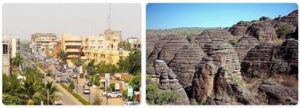Burkina Faso, a landlocked country in West Africa, is characterized by a diverse cultural landscape, rich history, and a predominantly rural population. With over 20 million inhabitants, Burkina Faso faces various challenges, including poverty, limited access to education and healthcare, and periodic droughts affecting agricultural productivity. The capital, Ouagadougou, serves as the political and economic center. Burkina Faso has experienced political instability, including a popular uprising in 2014 that led to the ousting of long-time President Blaise Compaoré. The country is now a presidential republic, with Roch Marc Christian Kaboré as the current head of state. Burkina Faso’s economy relies heavily on agriculture, and recent efforts aim to diversify into mining and renewable energy. In terms of foreign policy, Burkina Faso emphasizes regional cooperation, particularly within the Economic Community of West African States (ECOWAS). The country actively participates in regional peacekeeping initiatives, contributing troops to various UN and African Union missions, as it grapples with internal security challenges related to terrorism and armed conflict, particularly in the Sahel region. Burkina Faso is part of the G5 Sahel group, which addresses security and development issues in coordination with Chad, Mali, Mauritania, and Niger. On the diplomatic front, Burkina Faso maintains relations with a range of countries and international organizations, with a focus on promoting development assistance, humanitarian aid, and collaboration on security matters. Despite being a landlocked nation, Burkina Faso engages in economic partnerships with neighboring countries and strives to enhance its infrastructure to facilitate trade. The country is an active participant in international forums, advocating for issues such as climate change, poverty reduction, and sustainable development. Burkina Faso has also been involved in peacebuilding efforts in the region, working towards conflict resolution and political stability. The country faces significant challenges in managing its borders and addressing the impact of regional conflicts, but it remains committed to finding diplomatic solutions to the complex security issues it confronts. In conclusion, Burkina Faso’s foreign policy is intricately linked to regional stability, economic development, and international collaboration, with a focus on addressing security concerns while seeking assistance for its social and economic challenges. The nation navigates a delicate balance between addressing internal issues and participating in broader regional and global initiatives to foster peace, development, and cooperation. PROZIPCODES: Features defense and foreign policy of Burkina Faso.
Burkina Faso Travel Information

The security situation in Burkina Faso has deteriorated considerably in recent years. There have been several terror attacks in the country since 2015, including in the capital Ouagadougou. Kidnappings of Westerners have occurred. Safety There have been several terrorist attacks…
Read more